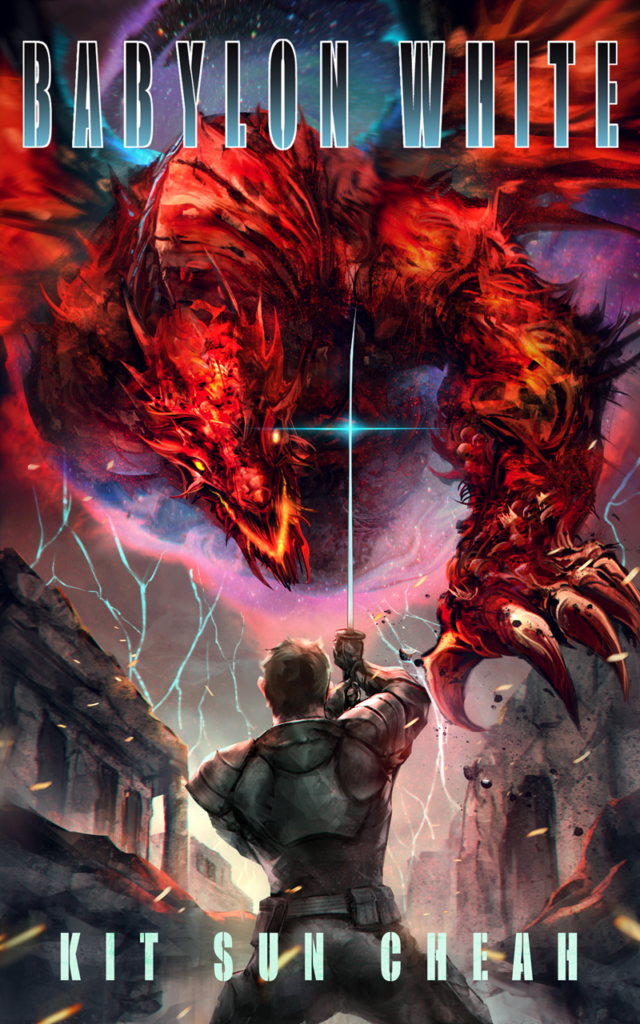
Every story has an ending.
It’s probably an unpopular notion among certain writers these days. The money lies in series fiction. The longer the series, the more money you earn. You only end the series when the money stops flowing in.
I don’t follow that philosophy. Most certainly not for Babylon. Which is why I’m running a Kickstarter for the last book in the series, Babylon White.
A series with infinite stories must necessarily lead to infinite stasis. The characters may engage in any number of adventures, but they do not change. They cannot change. For if they keep changing, they become unrecognisable. Being radically different from who they were at the beginning, the stories that can be told would not fit into the framework established in the first book of the series.
Likewise, the story world cannot change. The characters may achieve some small-scale triumphs, but in the grand scheme of things, they do nothing that will upset the world. They cannot. To do otherwise would be to upend the world order that gives rise to infinite adventures, and either end the series or alter it so dramatically it might as well be ended. And, more to the point, it would also end all income from future books.
This approach isn’t necessarily a bad thing. Many renowned and beloved series were based on the concept. From The Shadow to The Executioner, Hardy Boys to Nancy Drew, and even Sherlock Holmes and Miss Marple, such series have become iconic. There is nothing wrong with static characters and static worlds, if handled properly.
These characters have transcended space, time, and even humanity itself, becoming avatars of timeless archetypes. And so long as they remain timeless, their worlds must also remain timeless, so that they may have a place in it. A detective cannot exist in a world without crime, an avenger has no purpose when every offender is dead.
But that’s not the world I want to write for Babylon.
Babylon is, quite literally, a hellhole. It is a world of high adventure, but also a world of high horror. The innocent who live in that world, what few remain, cry out to the heavens for justice. It is a world where evil triumphs and madness reigns, where the valiant and the virtuous must creep like thieves in the night.
It is not a world that should be allowed to exist.
And yet… seven years ago, when I began work on Babylon Blues, I had no idea how it would end.
All I knew was that I had to crank out the first six stories. The stories that would set in motion the events leading to the fall of Babylon. And the stories that would lay the foundation for the rest of the series.
The finale of Babylon Blues posits a two-year period where Yuri Yamamoto had to go into exile. In-story, it made logical sense. When seven archdevils are after your head and the government has abandoned you, what else can you do? At the same, I had to give Yuri a reason to come back.
And yet…
That two-year gap created space for adventure. A space that had to be filled by those left behind.
Enter Babylon Red. It was Kayla Fox’s story—and yet, in every sense, it is also a continuation of Yuri’s story, with him providing advice and inspiration even when he is off the page.
As I worked on the book, I had to set the stage for the ending of Babylon. The series, I knew, would begin proper from this point forward. The question was how to give it the ending it deserved.
There was only one good ending for Babylon: the end of the New Gods. With the New Gods so evenly matched against each other, there was only one way to set up their end. By knocking out at least one of the New Gods.
It isn’t enough to create a power vacuum. It had to be dramatic. Catastrophic. It had to create nothing less than chaos. A special kind of chaos. One that wreaks havoc among the New Gods, yet allows the humans room to act.
But how could I set it up?
Hence the need for Babylon Red and Babylon Black to flow into each other. Babylon Red sets the stage for Babylon Black. Babylon Black sets the stage for the apocalypse in Babylon White.
Another, more skilled, author would have meticulously plotted out every single plot thread and character interaction. Not me.
I allowed events to flow organically from the premises established in Babylon Blues. Having established that the New Gods were at each other’s throats, that they fight through proxies, and that the only person they hate more than each other is Yuri Yamamoto, it only makes sense that they would constantly seek to one-up each other. They would escalate and escalate and escalate some more, until Babylon reaches the breaking point.
And humanity, of course, would develop countermeasures to defeat the New Gods.
Events never play out as expected. Looking back, you might be able to puzzle together how one event leads to another. But looking forward? All you can do is predict the probable outcome of events based on what little you know. And what you don’t know will always catch you off guard.
The evolution of Babylon tries to reflect this organic, chaotic, inevitable escalation into the eschaton. Nobody willingly plans an apocalypse, least of all the New Gods. But they will take advantage of it if it happens.
Based on these ideas, I crafted the stories that would make up Babylon Red and Babylon Black. At the end of Babylon Black, I had to pick the New Gods that would be the first to be vanquished. Those who have read the book will know which of the New Gods I chose. Why did I make that choice?
Because they were the weakest.
All the other New Gods were decentralised in varying degrees, rendering them resistant to the kind of alpha strike Yuri and his allies are realistically capable of. But the gods I chose? Their organisations were centralised. And what is massive and centralised presents an enormous attack surface.
Again, this was not planned. I didn’t have to plan it. It simply emerged organically from the logic of the story, laid down in Book 1 seven years ago.
And now, at last, we come to the place where Babylon ends.
Babylon White wasn’t planned. The point of the book was to capture the chaos that would come with the collapse of civilization. Too much planning would undermine the very premise of the book.
But the characters would have planned well ahead of time. So they would execute their plans. All I had to do was figure out their plans, then set them in motion and watch them collide. Then, based on their goals and motivations and basic military principles, I could figure out what happens next.
And so I did.
I carried out enough ‘planning’ to set up the events of the book, and to keep the plot pointed towards the apocalyptic ending. After that, I gave my imagination room to roam. And the result…
…Well, you’ll have to see it to believe it.
Which is why I’ll be sharing snippets of the story over the coming weeks. I’m sure you’ll agree that it’s an evolution of everything I’ve done so far—and that it nothing like anything out there.
Come and see where Babylon ends. Come back Babylon White on Kickstarter here.
